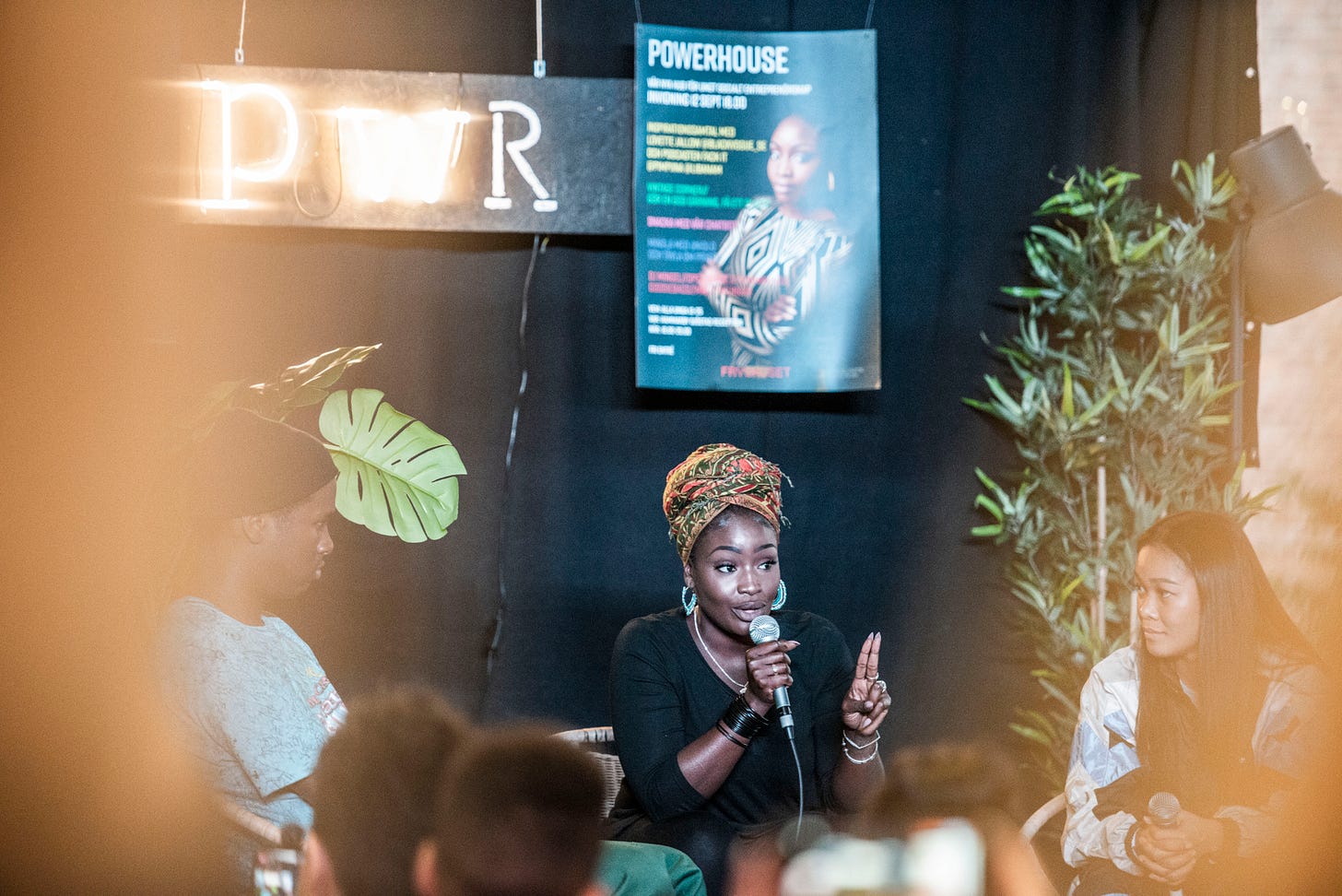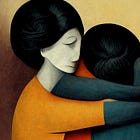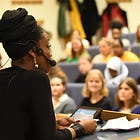Why Autistic Daughters Often Go No-Contact with Their Mothers
Exploring parentification, survival roles, and the journey toward self-rescue.
Why So Many Autistic Daughters Experience Trauma in Mother-Daughter Relationships
Many autistic women grow up believing the issue is them - that they are "too sensitive," "too dramatic," or "too cold." But what if the rupture wasn't within us at all? What if it was within the people raising us?
For years, I thought the friction in my relationship with my mother was just personal, being raised by my grandmother, a clash of personalities, an isolated struggle. Now I know it was structural.
When you are an undiagnosed autistic girl raised by an undiagnosed autistic mother - especially one shaped by suppression, patriarchy, or survival-mode parenting - you are often cast into roles you were never meant to carry.
You become the emotional support animal in the home.
You are told who you are allowed to be.
You learn to suppress instinct, intuition, and honesty - all for the sake of keeping peace with someone who never had any.
This is not about blame. It is about a pattern too many of us carry without words. In my work with autistic children and their families, I have witnessed something extraordinary: daughters becoming the bridge between past and future.
But healing requires more than love.
Healing requires truth.
And for many of us, the truth is: Our mothers were not safe places.
Inherited but Denied: The Hidden Genetic Reality of Autism
As I once calmly explained to a parent: Your child did not download autism from the cloud.
Autism is not a glitch. It is not a tragedy. It is not caused by screen time or modern parenting trends. It is heritable. Scientific studies consistently show autism has a strong genetic component, with heritability rates estimated between 70% to 90%.
Which means this: Many mothers who labeled their autistic daughters as "difficult," "dramatic," or "too much" were unknowingly looking at reflections of their own undiagnosed selves.
Some inherited sensory sensitivity.
Some inherited emotional intensity.
Some inherited executive dysfunction, masked for years as being "scatterbrained" or "forgetful."
But because survival - not self-understanding - was prioritized for generations, many mothers handed down coping strategies rooted in shame, control, masking, and emotional suppression. Not out of cruelty. Out of survival.
Breaking the silence around autistic lineage does not just free ourselves. It redraws the map for future generations - one built on recognition, not repression.
Masking and Misunderstanding Between Undiagnosed Autistic Mothers and Daughters
When autistic traits are unnamed - or worse, punished - what forms between mothers and daughters is not safety. It is survivalism.
Many autistic daughters grew up learning that masking wasn't optional. It was survival:
Masking sensory overwhelm to avoid punishment
Repressing emotional intensity to avoid shame
Faking ease in environments that felt suffocating just to be accepted
And often, it was their own undiagnosed autistic mothers - raised under the same survival pressures - who reinforced these lessons:
Mothers who needed control to feel safe
Mothers who needed their daughters to perform "normalcy" to feel they hadn't failed
Mothers whose own masking became so automatic they could no longer recognize the cost - to themselves, or to their children
This isn't about villainizing mothers. It's about naming the survival patterns that masqueraded as love but demanded invisibility. Because love without recognition is not love. It is performance.
For autistic daughters, survival often meant shrinking - until one day, the cost of shrinking became unbearable.
When Autistic Masking Breaks and Estrangement Becomes Survival for Autistic Daughters
At some point, the weight of masking becomes too heavy to carry. The daughter who once internalized silence, accommodation, and shame fractures under the impossible expectation to stay unseen.
That fracture feels like betrayal - not just of the mother, but of the entire system that demanded loyalty at the cost of self.
When autistic daughters begin setting boundaries, the rupture can be violent:
Mothers accuse them of ingratitude.
Families weaponize "after all we've done for you" narratives.
Estrangement becomes inevitable - not because love was absent, but because love was conditional.
Grieving an estranged mother is unlike other grief. You are not just mourning the relationship you lost - you are mourning the mother you needed but never had. You grieve the possibility that someday she might have seen you without resentment, without conditions, without asking you to disappear inside her definitions.
For many autistic daughters, this realization is not a single dramatic moment. It is the slow accumulation of daily betrayals:
The time you were punished for having needs.
The time your emotions were twisted into manipulation.
The years spent translating yourself into a language she never cared to learn.
I remember when it became clear for me. When 30,000 SEK disappeared from my account, I thought it was identity theft. I called the police. Then I called my mother. It was her. The woman I had spent my entire life protecting, justifying, and silencing myself for - robbed me under the banner of motherhood. She would do it many times over after that.
Trauma researchers estimate that 80% of autistic individuals experience trauma tied to caregivers. This isn't abstract data to me. It is lived reality. Estrangement, for many of us, is not a rebellion.
It is a boundary that grief forced us to build. Self-rescue begins when you finally realize: The failure was never yours to carry. It was hers to heal - and she chose not to. And so you grieve. Not because you failed to be lovable. But because you deserved love without conditions.
Gilmore Girls Wasn't a Blueprint It Was a Warning for Autistic Daughters
When a mother-daughter relationship fractures, it shatters more than family ties. It dismantles the internal blueprint you were handed for love, safety, and belonging.
I am grateful my grandmother took on the role of parenting and centered my needs. But for autistic daughters, rebuilding the self is not simply about setting boundaries. It is about learning to exist without shame in a body and mind that were constantly misread - even by those who claimed to love you.
Popular culture romanticizes maternal bonds, but reality often cuts deeper. Shows like Gilmore Girls sold a dream - not a blueprint. Lorelai and Rory's witty banter wasn't just dialogue. It was a branding of closeness that ignored the costs of blurred boundaries and emotional enmeshment.
In truth, many of us were not sipping coffee with our mothers. We were calming their breakdowns, hiding their debts, absorbing their projections. It wasn't a cozy generational gap. It was survival - masked by performance.
And for autistic girls - already forced to mask and manage emotions we barely understood - that survival came at the cost of our own personhood.
We learned silent masking. We learned emotional role reversal. We learned how to disappear inside their needs before we ever named our own.
The old survival strategies do not serve the life you are building now:
Masking to be acceptable
Shrinking to be tolerable
Silencing yourself to maintain peace
They were manuals for survival under duress, not maps for thriving.
Rebuilding yourself means grieving not only the mother you lost, but the younger self you were forced to abandon to survive her. Your anger is not cruelty. Your sadness is not betrayal. Your boundaries are not punishments. Choosing yourself was never abandonment. It was self-rescue - and it still is.
When Autistic Daughters Are Parentified Forced Into Parenting Their Mothers
For many autistic daughters, the deepest betrayal wasn't the emotional distance. It was the quiet, gradual role reversal that forced them to become caregivers to the very people meant to protect them.
Emotional role reversal happens without ceremony:
You soothe your mother's rage instead of being comforted.
You validate her choices while yours are questioned.
You become her secret-keeper, therapist, and scapegoat.
This is not just dysfunction. It is caregiver trauma - a systemic reversal that steals your right to be a child.
Autistic girls are especially vulnerable because of the emotional labor expected of them:
We were taught to anticipate emotional needs.
We were taught to mask discomfort.
We were taught to absorb blame to preserve family peace.
Absorbing your mother's pain does not heal her. It only deepens the wound inside yourself - until withdrawal becomes the only path to survival.
Understanding that your mother was likely unsupported, unparented, and undiagnosed may explain the trauma. But it does not excuse the harm. Survival forced you to grow up too soon. Healing requires laying that burden down - without apology.

Why Healing From Mother-Daughter Trauma Doesn't Always Mean Reunion

Choosing yourself is not cruelty, and protecting your peace is not revenge. Healing demands grieving the relationship you needed, not clinging to the one that harmed you.
No-contact is often mischaracterized as cold, selfish, or unforgiving. In reality, it is sometimes the most compassionate act - for yourself, and for the person unwilling to change.
In the groups I have facilitated for autistic children and their families, reconciliation was never framed as the goal. Safety was the goal. Agency was the goal.
Sometimes reconciliation happens - when accountability, repair, and real transformation take root. But often, the healthiest outcome is distance: an adult daughter reclaiming her autonomy, refusing to be reabsorbed into a system that demanded her silence.
Estrangement is not failure. It is survival - with your dignity.
How Autistic Women Reparent Their Inner Child After Family Estrangement
At some point in the healing journey, you realize: you are the adult your younger self has been waiting for.
You are the voice that says:
You do not have to mask to be loved.
Your emotions are not punishments.
Your difference is not a defect.
Reparenting yourself as an autistic woman is not about pretending the past didn't happen. It is about building the home inside yourself that no one else built for you. It is about recognizing that validation from someone who could not even validate herself is not the prize.
Freedom is the prize. Peace is the prize. Self-trust is the prize. You do not need her permission to heal. You do not need her apology to move forward. You do not need to fold yourself back into the silence that almost erased you. You were never too much. You were simply too whole for systems - including family systems - built on shrinking.
The life you are rebuilding now is not an act of rebellion. It is an act of remembrance. A remembering of who you were before the world told you who you were allowed to be.
You Are Not the Broken Branch You Are the Root Healing Generations

You did not break the lineage. You stopped the bleeding. You did not betray your mother. You protected the child she could not - or would not - fully see.
Healing from caregiver trauma is not about erasing what happened. It is about refusing to let what happened define the rest of your life. Estrangement, grief, and self-rescue are not proof of failure. They are evidence of survival.
You are not the broken branch. You are the root repairing itself - for yourself, for those who come after you, for the parts of you that were never meant to be abandoned.
Work With Me: Inclusion Strategy, Keynotes, and Critical Conversations

In addition to writing, I work internationally as a neurodivergent inclusion strategist, keynote speaker, and consultant.
I help organizations move beyond surface-level diversity initiatives to create environments where neurodivergent, disabled, and marginalized individuals are genuinely supported.
If your organization, collective, or institution is ready to rethink accessibility, inclusion, and systemic accountability, you can book me for:
Lectures
Keynote speeches
Panel discussions
Workshops and trainings
🔹 Book me: lovettejallow.com
🔹 Contact: Lovette@Lovettejallow.com
Explore More from The Lovette Jallow Perspective
You can find more of my essays exploring:
Neurodivergence, autism, and navigating public life as a Black woman
Building true inclusion beyond checkbox diversity
Reclaiming voice and agency across personal, political, and historical landscapes
Racism in Sweden and systemic injustice
Each essay connects real-world experience with structural analysis—equipping individuals and institutions to think deeper, act smarter, and build sustainable change.
Who is Lovette Jallow?
Lovette Jallow is one of Scandinavia’s most influential voices on systemic racism, intersectional justice, and human rights. She is a nine-time award-winning author, keynote speaker, lecturer, and humanitarian specializing in:
Neurodiversity and workplace inclusion
Structural policy reform
Anti-racism education and systemic change
As one of the few Black, queer, autistic, ADHD, and Muslim women working at the intersection of human rights, structural accountability, and corporate transformation, Lovette offers a uniquely authoritative perspective rooted in lived experience and professional expertise.
Her work bridges theory, research, and action—guiding institutions to move beyond performative diversity efforts and toward sustainable structural change.
Lovette has worked across Sweden, The Gambia, Libya, and Lebanon—tackling institutional racism, legal discrimination, and refugee protection. Her expertise has been sought by outlets like The New York Times and by leading humanitarian organizations addressing racial justice, policy reform, and intersectional equity.
Stay Connected
➔ Follow Lovette Jallow for expert insights on building equitable, neurodivergent-affirming environments.
🔹 Website: lovettejallow.com
🔹 LinkedIn: linkedin.com/in/lovettejallow
🔹 Instagram: instagram.com/lovettejallow
🔹 YouTube: youtube.com/@jallowlovette
🔹 Twitter/X: twitter.com/lovettejallow
🔹 Bluesky: bsky.app/profile/lovettejallow.bsky.social

















This is an absolutely stunning piece. Thank you sharing this work. I am blown away by all you’ve incorporated, the clarity, and the wisdom. Impressive and deeply kind.
This is exactly what I needed to read. I’ve been feeling so much guilt and shame and have been seeing the recent estrangement as a sign of failure. But your words have reminded me of what I’ve always known to be true, particularIy now that I know I’m autistic. I need to be away from her to keep my peace 🙏🏼 thank you so much.